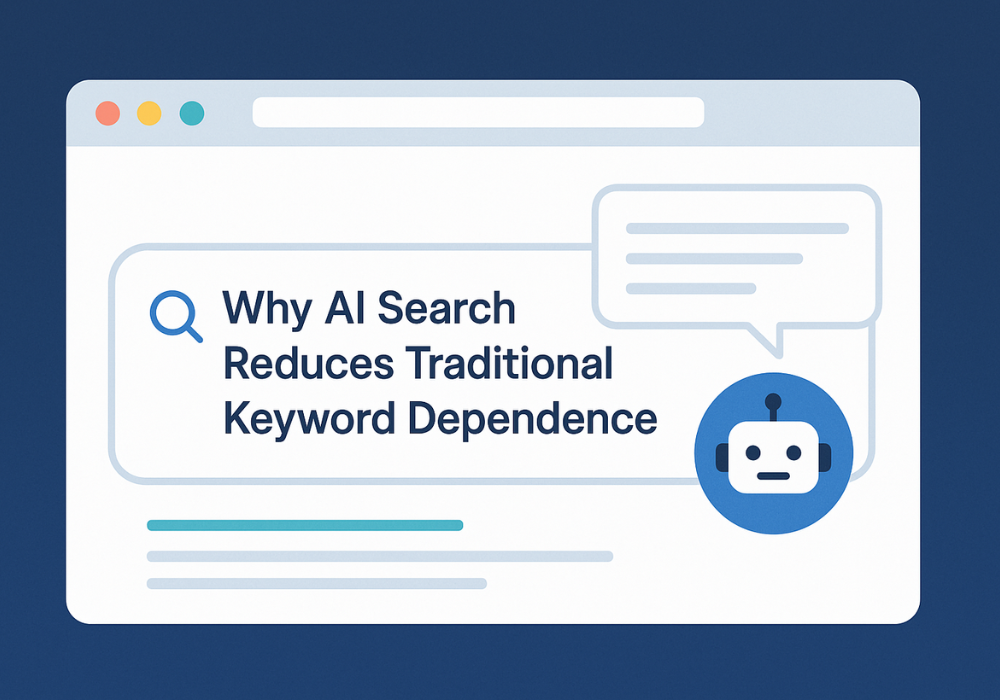Why AI Search Reduces Traditional Keyword Dependence

Search is going through its biggest shift in years. AI is rewriting how people find information, how results appear, and what type of content gains visibility. The old pattern was simple. Users typed a keyword, Google showed links, and websites competed for rankings. Today the experience is very different. AI is moving search away from long lists of blue links and toward direct answers that appear instantly on the results page. Because of this change, keywords are no longer the only factor that decides visibility.
This shift is important for businesses that rely on organic traffic. It affects how users search, how content is interpreted, and how websites are chosen for AI generated answers. In this blog, we will look at why AI search reduces traditional keyword dependence and what brands can do to stay visible.
AI understands intent, not just keywords
The biggest difference between old search and AI search is intent understanding. Traditional search engines depended heavily on matching the exact keywords used by the user. If someone typed “best digital marketing agency in Kerala,” Google would look for pages that used this phrase or a close variation.
AI works differently. It tries to understand what the user actually wants, even if the exact keywords are not present. It can recognise context, compare meanings, and return answers based on the most accurate interpretation. This reduces the importance of repeating the same keyword many times. Instead, AI rewards content that clearly satisfies user intent.
To support this shift, businesses must create helpful, topic focused content rather than relying on exact match keywords. If you want to target users searching for digital services in Kerala, you need content that explains processes, solutions, benefits, and real examples. Keyword stuffing is not only ineffective but can harm credibility.
For guidance on topic depth and service relevance, you can explore the page on digital marketing agency in Kerala at adaminnovations.in
AI generates answers directly on the search page
Another reason keywords matter less is the rise of answer based results. Search engines use AI to provide an immediate explanation or recommendation right on the screen. The user may not even click on any link. This is known as a zero click experience.
When AI summarises information, it does not pull content based on specific keywords. It collects ideas, facts, and signals from various sources. The websites that feed these answers are chosen because they show authority and clarity, not because they repeat a certain keyword.
If your page answers common questions, explains a topic simply, and provides structured information, AI can use your content even without perfect keyword match. This is why long form guides, how to articles, and question based content now perform better than short keyword heavy posts.
AI prefers topics, entities, and relationships
AI search engines rely on topic understanding and entity recognition. Entities are people, places, businesses, products, and concepts. When AI understands how entities relate to each other, it can answer user questions more accurately.
For example, someone may search “best SEO advice for small websites” without mentioning Kerala or Calicut. AI can still connect the query to your business based on topic relevance and authority. This reduces the value of depending only on one or two primary keywords.
To strengthen your topical authority, it helps to build supporting articles that connect related subjects. If you want to improve visibility for SEO related searches, visit the SEO service page and consider linking your content in a similar structure.
AI relies on helpful content rather than word repetition
Search is moving in a direction where clarity, usefulness, and accuracy matter more than keywords. AI is trained to look for content that solves problems. It reads your page the way a human would. A page that is simple, direct, and informative will perform better than a page overloaded with exact match phrases.
This is why the Helpful Content guidelines have become a major part of optimisation. Good formatting, clear answers, and strong examples now have more impact than keyword placement. Brands that adapt to this new style will stay visible even as search continues to move toward AI driven results.
How businesses can adapt
Here are some practical steps to stay strong in AI search:
- Create content clusters around your core services
- Answer user questions directly and clearly
- Use natural language instead of forced keyword patterns
- Add examples, use cases, and insights from your field
- Maintain fast, clean, and trustworthy pages
- Build topical authority with supporting articles
- Refresh outdated blogs for new user intent patterns
Final thoughts
AI is reducing the dependence on traditional keywords, but it is also opening new opportunities. Websites that focus on value driven content will stand out. Instead of chasing exact phrases, focus on understanding the user and giving them what they came for. By doing this, you build long term trust, which is the real ranking factor in the new search environment.